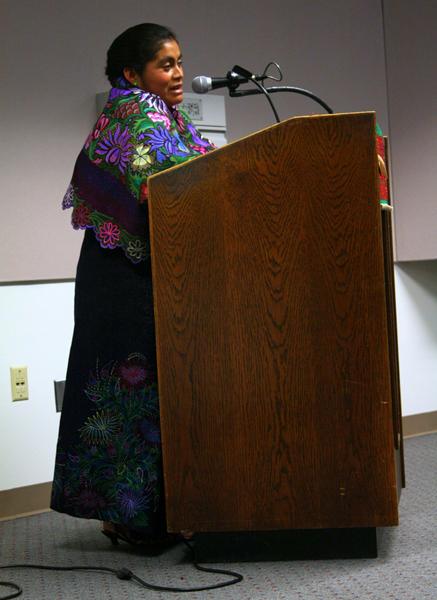In the highlands of Chiapas, Mexico, Margarita Hernandez found her bearing. But before she could follow it, she had to find her voice.
It was not a simple story for her to tell. Hernandez, an indigenous woman from Mexico, stood draped in floral pinks and purples — the colors of her pueblito, or “small village” — before an estimated 65 students, faculty and staff Wednesday in the Anatol Center.
Displayed along the tables of the room were garments embroidered with geometric shapes and symbols, but Hernandez offered more than her crafts; she carried along her story and what she felt was her responsibility to the indigenous people of Chiapas.
For years, Mexico has faced the complex divergence between the indigenous confined to the rural areas and those who dwell in the increasingly urbanizing cities. The Mexico Supreme Court issued a law in 2001 that excludes political rights for Mexican Indians, the closest they have ever been to political sovereignty.
Along with “de jure” discrimination, Hernandez spoke of her personal treatment by non-indigenous Mexicans. In urbanized areas, including Mexico City and Cancun, Hernandez has been lied to, regarded as dirty and treated like an animal.
“I’m not an animal. I am a child of God,” Hernandez said.
Although the women in Hernandez’s community fall under the shadow of machismo, she said they have a different way of life.
“We are indigenous, but we have our own beliefs and traditions,” Hernandez said.
Hernandez recalled her life as a young girl in Na Chij, a small pueblo in the Chiapas highlands, as destined for an endless amount of housework. She spoke Tzotzil and Tzeltal, but lacked any legitimate autonomy without knowledge of Spanish.
The women in these communities were told their place was at home, tending to their children. Faced with discrimination from Catholic Mexicans and oppressed under the order of the men in her life, Hernandez searched for other options.
With the blessing of her mother, Hernandez left in 2003 to study in San Cristóbal de las Casas, where she learned Spanish. It was then that she joined other indigenous women to form Mujeres Mayas de Jobel, or “Mayan Women of Jobel,” a cooperative that primarily sells garments to tourists around Mexico.
Hernandez works among 10 different artisan cooperatives in Chiapas, designing and producing handmade clothing.
“There are other groups as well, and each group has a testimony, has a story,” Hernandez said.
She does it to prevent the loss of culture and art.
“It’s part of our memories, of our stories,” Hernandez said.
It is also part of their identity. The garments are unique to each pueblo and reflect the land, fauna and animals that have been a part of their culture for generations. They do what is in their hearts.
Hernandez reiterated that their situation has no easy solution. It will be challenging and gratifying, but no matter what, they will continue to follow their path — they will continue fighting.




